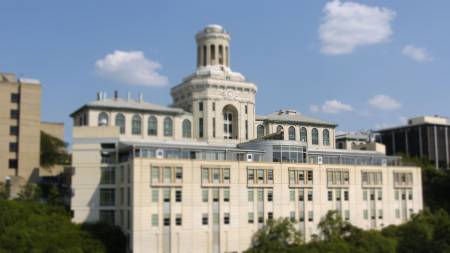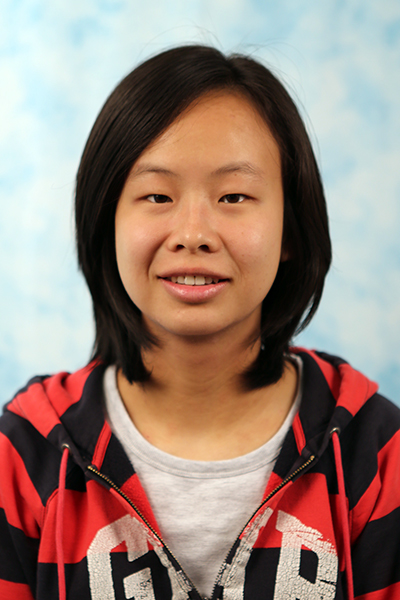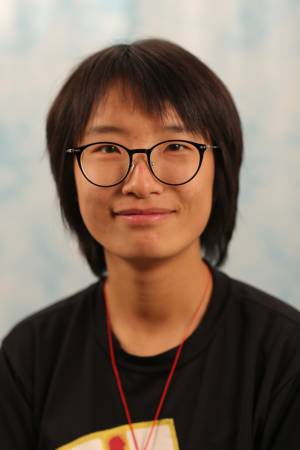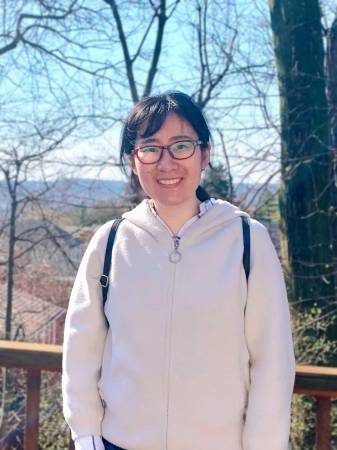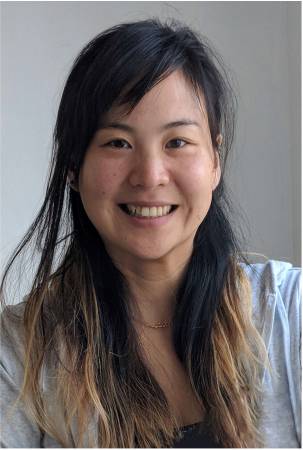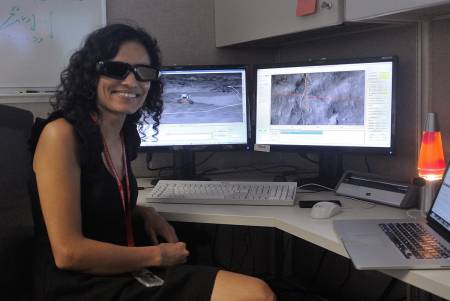What do generative models know about geometry and illumination?
Abstract: Generative models can produce compelling pictures of realistic scenes. Objects are in sensible places, surfaces have rich textures, illumination effects appear accurate, and the models are controllable. These models, such as StyleGAN, can also generate semantically meaningful edits of scenes by modifying internal parameters. But do these models manipulate a purely abstract representation of the [...]
Life as a Professor Seminar
Have you ever wondered what life is like as a professor? What do professors do on a daily basis? What makes the faculty career challenging and rewarding? Maybe you have even thought about becoming a faculty member yourself? Join us on March 22nd from 2:00 - 3:30 PM, where a panel of CMU faculty will [...]
Carnegie Mellon University
System Identification and Control of Multiagent Systems Through Interactions
Abstract: This thesis investigates the problem of inferring the underlying dynamic model of individual agents of a multiagent system (MAS) and using these models to shape the MAS's behavior using robots extrinsic to the MAS. We investigate (a) how an observer can infer the latent task and inter-agent interaction constraints from the agents' motion and [...]
Examining the Role of Adaptation in Human-Robot Collaboration
Abstract: Human and AI partners increasingly need to work together to perform tasks as a team. In order to act effectively as teammates, collaborative AI should reason about how their behaviors interplay with the strategies and skills of human team members as they coordinate on achieving joint goals. This talk will discuss a formalism for [...]
A Multi-view Synthetic and Real-world Human Activity Recognition Dataset
Abstract: Advancements in Human Activity Recognition (HAR) partially relies on the creation of datasets that cover a broad range of activities under various conditions. Unfortunately, obtaining and labeling datasets containing human activity is complex, laborious, and costly. One way to mitigate these difficulties with sufficient generality to provide robust activity recognition on unseen data is [...]
RI Faculty Business Meeting
Meeting for RI Faculty. Discussions include various department topics, policies, and procedures. Generally meets weekly.
A Constructivist’s Guide to Robot Learning
Over the last decade, a variety of paradigms have sought to teach robots complex and dexterous behaviors in real-world environments. On one end of the spectrum we have nativist approaches that bake in fundamental human knowledge through physics models, simulators and knowledge graphs. While on the other end of the spectrum we have tabula-rasa approaches [...]
Robot Learning by Understanding Egocentric Videos
Abstract: True gains of machine learning in AI sub-fields such as computer vision and natural language processing have come about from the use of large-scale diverse datasets for learning. In this talk, I will discuss if and how we can leverage large-scale diverse data in the form of egocentric videos (first-person videos of humans conducting [...]
Eye Gaze for Intelligent Driving
Abstract: Intelligent vehicles have been proposed as one path to increasing vehicular safety and reduce on-road crashes. Driving intelligence has taken many forms, ranging from simple blind spot occupancy or forward collision warnings to lane keeping and all the way to full driving autonomy in certain situations. Primarily, these methods are outward-facing and operate on [...]
Dense 3D Representation Learning for Geometric Reasoning in Manipulation Tasks
Abstract: When solving a manipulation task like "put away the groceries" in real environments, robots must understand what *can* happen in these environments, as well as what *should* happen in order to accomplish the task. This knowledge can enable downstream robot policies to directly reason about which actions they should execute, and rule out behaviors [...]
RI Faculty Business Meeting
Meeting for RI Faculty. Discussions include various department topics, policies, and procedures. Generally meets weekly.
Next-Generation Robot Perception: Hierarchical Representations, Certifiable Algorithms, and Self-Supervised Learning
Spatial perception —the robot’s ability to sense and understand the surrounding environment— is a key enabler for robot navigation, manipulation, and human-robot interaction. Recent advances in perception algorithms and systems have enabled robots to create large-scale geometric maps of unknown environments and detect objects of interest. Despite these advances, a large gap still separates robot [...]
Autonomous mobility in Mars exploration: recent achievements and future prospects
Abstract: This talk will summarize key recent advances in autonomous surface and aerial mobility for Mars exploration, then discuss potential future missions and technology needs for Mars and other planetary bodies. Among recent advances, the Perseverance rover that is now operating on Mars includes new autonomous navigation capability that dramatically increases its traverse speed over [...]
Passive Coupling in Robot Swarms
Abstract: In unstructured environments, ant colonies demonstrate remarkable abilities to adaptively form functional structures in response to various obstacles, such as stairs, gaps, and holes. Drawing inspiration from these creatures, robot swarms can collectively exhibit complex behaviors and achieve tasks that individual robots cannot accomplish. Existing modular robot platforms that employ dynamic coupling and decoupling [...]
RI Faculty Business Meeting
Meeting for RI Faculty. Discussions include various department topics, policies, and procedures. Generally meets weekly.
Structures and Environments for Generalist Agents
Abstract: We are entering an era of highly general AI, enabled by supervised models of the Internet. However, it remains an open question how intelligence emerged in the first place, before there was an Internet to imitate. Understanding the emergence of skillful behavior, without expert data to imitate, has been a longstanding goal of reinforcement [...]
Learning novel objects during robot exploration via human-informed few-shot detection
Abstract: Autonomous mobile robots exploring in unfamiliar environments often need to detect target objects during exploration. Most prevalent approach is to use conventional object detection models, by training the object detector on large abundant image-annotation dataset, with a fixed and predefined categories of objects, and in advance of robot deployment. However, it lacks the capability [...]
Learning to Perceive and Predict Everyday Interactions
Abstract: This thesis aims to develop a computer vision system that can understand everyday human interactions with rich spatial information. Such systems can benefit VR/AR to perceive the reality and modify its virtual twin, and robotics to learn manipulation by watching human. Previous methods have been limited to constrained lab environment or pre-selected objects with [...]
Faculty Candidate: Wenshan Wang
Title: Towards General Autonomy: Learning from Simulation, Interaction, and Demonstration Abstract: Today's autonomous systems are still brittle in challenging environments or rely on designers to anticipate all possible scenarios to respond appropriately. On the other hand, leveraging machine learning techniques, robot systems are trained in simulation or the real world for various tasks. Due to [...]
From Videos to 4D Worlds and Beyond
Abstract: Abstract: The world underlying images and videos is 3-dimensional and dynamic, i.e. 4D, with people interacting with each other, objects, and the underlying scene. Even in videos of a static scene, there is always the camera moving about in the 4D world. Accurately recovering this information is essential for building systems that can reason [...]
Learning Models and Cost Functions from Unlabeled Data for Off-Road Driving
Abstract: Off-road driving is an important instance of navigation in unstructured environments, which is a key robotics problem with many applications, such as exploration, agriculture, disaster response and defense. The key challenge in off-road driving is to be able to take in high dimensional, multi-modal sensing data and use it to make intelligent decisions on [...]
Active Vision for Manipulation
Abstract: Decades of research on computer vision has highlighted the importance of active sensing -- where the agent actively controls parameters of the sensor to improve perception. Research on active perception the context of robotic manipulation has demonstrated many novel and robust sensing strategies involving a multitude of sensors like RGB and RGBD cameras, a [...]
Teruko Yata Memorial Lecture : Mobility and Manipulation Independence with Interface-Aware Robotics Intelligence
Dr. Brenna Argall is an associate professor of Mechanical Engineering, Electrical Engineering & Computer Science and Physical Medicine & Rehabilitation at Northwestern University. Her research lies at the intersection of robotics autonomy, machine learning and human rehabilitation. She is director of the assistive & rehabilitation robotics laboratory (argallab) at the Rehabilitation Institute of Chicago (RIC, [...]
RI Faculty Business Meeting
Meeting for RI Faculty. Discussions include various department topics, policies, and procedures. Generally meets weekly.
Mars Robots and Robotics at NASA JPL
Abstract: In this seminar I’ll discuss Mars robots, the unprecedented results we’re seeing with the latest Mars mission, and how we got here. Perseverance’s manipulation and sampling systems have collected samples from unique locations at twice the rate of any prior mission. 88% of all driving has been autonomous. This has enabled the mission to [...]
Continually Improving Robots
Abstract: General purpose robots should be able to perform arbitrary manipulation tasks, and get better at performing new ones as they obtain more experience. The current paradigm in robot learning involves training a policy, in simulation or directly in the real world, with engineered rewards or demonstrations. However, for robots that need to keep learning [...]
Carnegie Mellon University
Parallelized Search on Graphs with Expensive-to-Compute Edges
Abstract: Search-based planning algorithms enable robots to come up with well-reasoned long-horizon plans to achieve a given task objective. They formulate the problem as a shortest path problem on a graph embedded in the state space of the domain. Much research has been dedicated to achieving greater planning speeds to enable robots to respond quickly [...]
Generative and Animatable Radiance Fields
Abstract: Generating and transforming content requires both creativity and skill. Creativity defines what is being created and why, while skill answers the question of how. While creativity is believed to be abundant, skill can often be a barrier to creativity. In our team, we aim to substantially reduce this barrier. Recent Generative AI methods have simplified the problem for 2D [...]
MSR Thesis Talk: Chonghyuk Song
Title: Total-Recon: Deformable Scene Reconstruction for Embodied View Synthesis Abstract: We explore the task of embodied view synthesis from monocular videos of deformable scenes. Given a minute-long RGBD video of people interacting with their pets, we render the scene from novel camera trajectories derived from in-scene motion of actors: (1) egocentric cameras that simulate the point [...]
Design Iteration of Dexterous Compliant Robotic Manipulators
Abstract: One goal of personal robotics is to have robots in homes performing everyday tasks efficiently to improve our quality of life. Towards this end, manipulators are needed which are low cost, safe around humans, and approach human-level dexterity. However, existing off-the-shelf manipulators are expensive both in cost and manufacturing time, difficult to repair, and [...]
MSR Thesis Talk: Shivam Duggal
Title: Learning Single Image 3D Reconstruction from Single-View Image Collections Abstract We present a framework for learning 3D object shapes and dense cross-object 3D correspondences from just an unaligned category-specific image collection. The 3D shapes are generated implicitly as deformations to a category-specific signed distance field and are learned in an unsupervised manner solely from unaligned [...]
Whisker Sensors for Unstructured Environments
Abstract: As robot applications expand from controllable factory settings to unknown environments, the robots will need a larger breadth of sensors to perceive these complex environments. In this thesis, I focus on developing whisker sensors for robot perception. The inspiration for whisker sensors comes from the biological world, where whiskers serve as tactile and flow [...]

